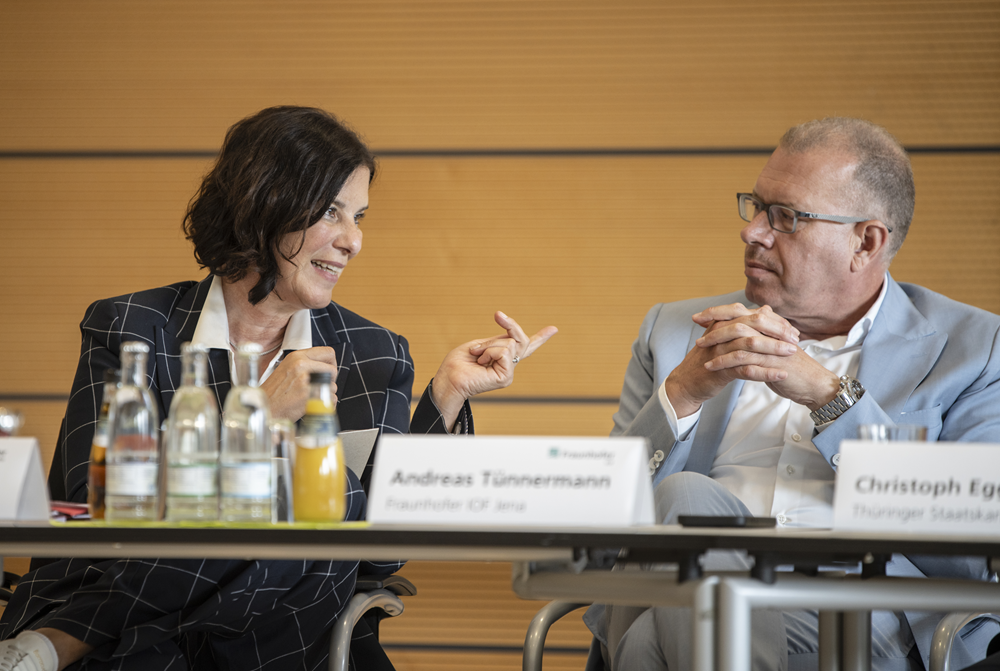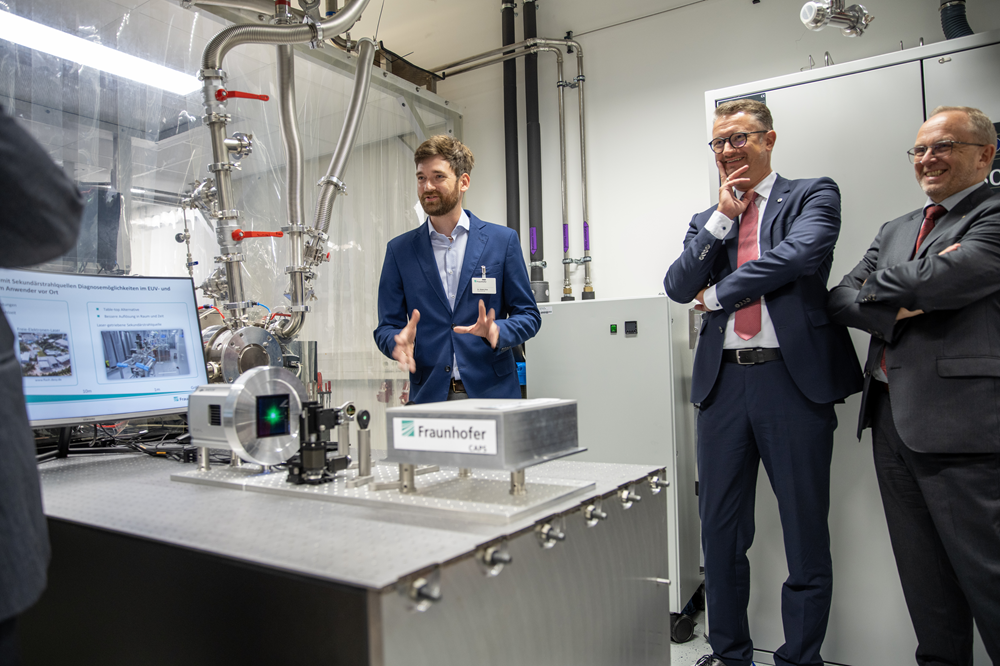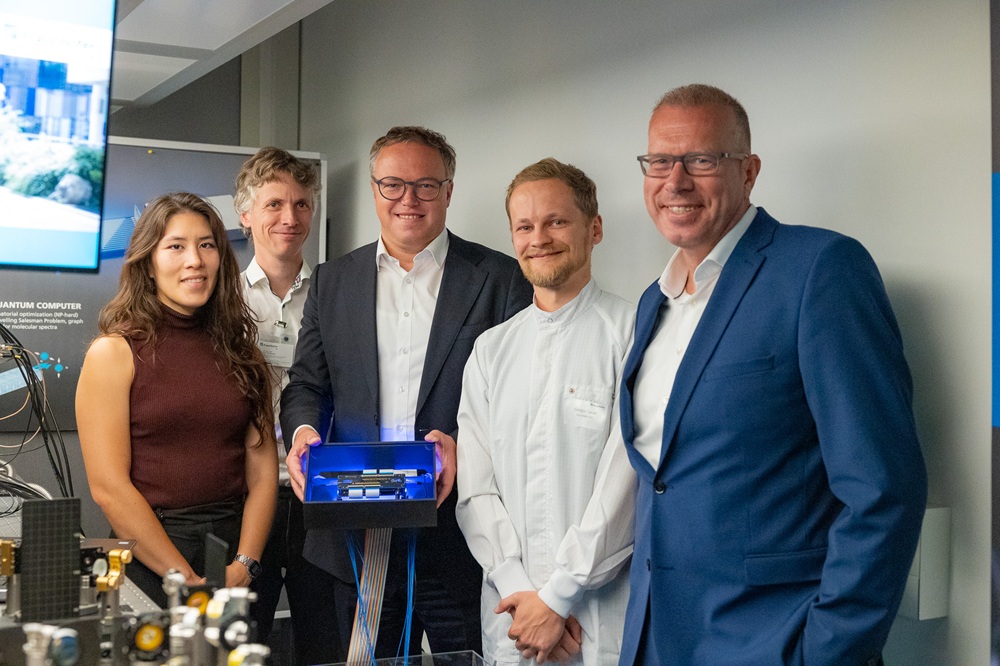Jena / August 06, 2025
Political summer guests at Fraunhofer IOF
Representatives of the Thuringian Cabinet visit the Institute
Summer slump at Fraunhofer IOF? Not a chance. As part of their respective summer tours, Thuringia's Minister of Economic Affairs Colette Boos-John and Minister of Science Christian Tischner visited the institute. Minister President Mario Voigt also stopped by and viewed a key component for Germany's first photonic quantum computer. The visits also show that Fraunhofer IOF is well positioned in the areas covered by the German government's recently released high-tech agenda.
Minister of Economic Affairs Boos-John: "Transfer at its best"
Thuringia's Minister of Economic Affairs Colette Boos-John kicked off a colorful summer program. With her visit to Fraunhofer IOF on July 3, she opened her summer tour, the "Möglichmacher-Tour" (engl.: Enablers Tour). The minister was particularly interested in Fraunhofer IOF's role as a driving force for innovation research and young entrepreneurship in the region.
In recent years, companies such as Quantum Optics Jena GmbH, microfluidic ChipShop, and optiX fab GmbH have emerged from the institute. The minister engaged in a lively discussion with the managing directors, who as former Fraunhofer researchers had laid the foundation for their business ideas at the institute, about opportunities, challenges, and necessary political measures to keep Thuringia attractive for young entrepreneurs. The minister praised the role of Fraunhofer IOF as "transfer at its best."
Minister of Science Tischner: "Beacons of the region"
Thuringia's Minister of Science Christian Tischner set a different focus with his visit on July 28. As part of his "HIGH-TECH-TOUR", Tischner said he wanted to "visit the special features, potential, and beacons of Thuringia." He gained an overview of Fraunhofer IOF's extensive portfolio in excellence research by visiting laboratories and was particularly interested in the institute's role as a training ground for the photonics industry.
Andreas Tünnermann, head of Fraunhofer IOF as well as director of the Institute of Applied Physics at Friedrich Schiller University, emphasized the importance of the Abbe School of Photonics and the Max Planck School of Photonics. Both are programs at Friedrich Schiller University that accompany students through a master's degree or doctoral program. Especially the Max Planck School of Photonics (MPSP), whose spokesperson is Andreas Tünnermann, is focused on offering an internationally competitive, top-notch graduate program to attract outstanding young talent from around the world to Jena, a city with a long tradition in optics. This approach has been successful: 140 young researchers from more than 30 countries are currently studying at the MPSP.
Minister President visits key component for quantum computers
In addition, Thuringia's Minister President Mario Voigt visited the institute on the Beutenberg Campus on July 31. He toured a quantum laboratory and was shown a very special component by the researchers: a Gaussian boson sampler. A Gaussian boson sampler is a special type of photonic quantum computer that is being developed as part of the PhoQuant research project by researchers at Fraunhofer IOF and other partners. PhoQuant has the ambitious goal of developing Germany's first photonic quantum computer. "This technology for quantum computing will put Germany far ahead," said Voigt, commenting on the significance of this and similar research projects at Fraunhofer IOF.
Tünnermann: "Visible momentum in science, industry, and society"
Institute Director Andreas Tünnermann is delighted with the keen interest shown by politicians: "I am very pleased to see that we were a popular stop for representatives of the Thuringian state government this summer. It shows that our work is providing visible impetus in science, industry, and society. At the same time, such dialogue formats give us the opportunity to highlight our current topics and needs so that we can continue to promote a strong innovation ecosystem in Thuringia."
German government's high-tech agenda – Thuringian players well positioned
The research activities presented during the visits are also in line with the German government's high-tech agenda, which was published at the end of July. In addition to artificial intelligence, microelectronics, biotechnology, and climate-neutral mobility, fusion research and quantum technologies are particularly high on the agenda. "In other words, all the topics that we address with our lighting solutions," comments Tünnermann.
He sums up: "The Fraunhofer Institute in Jena and its Thuringian partners are well positioned here. Between 2019 and 2023 alone, federal funding for photonics and quantum technologies totaling around 100 million euros was secured for Thuringia in competitive bidding."


